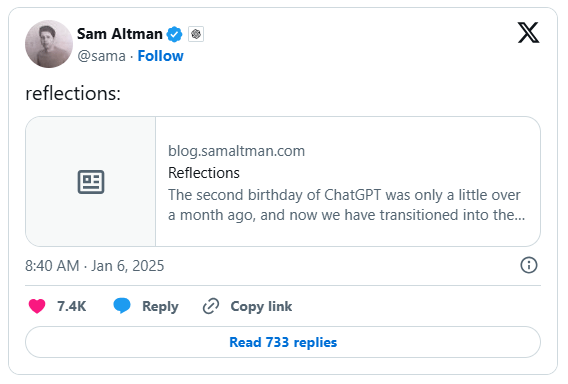OpenAI: The first AI agent could enter the workforce by 2025
The next few years could be a transformative time for AI, and therefore for the job market we're all trying to navigate. But according to OpenAI CEO Sam Altman, things are moving at an incredible pace, meaning the first AI agents could enter the workforce by 2025. And that could spell disaster for some.
OpenAI is Focusing on Super Intelligence via ChatGPT
OpenAI has been a leader in the field of Generative AI for the past few years, with ChatGPT becoming a household name, much like Google became the number one search engine. However, OpenAI is keen to move beyond its current products and instead focus on 'superintelligence.'
Sam Altman, CEO of OpenAI, outlined his personal vision for the company's next move in a blog post simply titled "Reflections." In it, he reflects on the past few years before looking ahead to what's next.

The bottom line is that Altman believes OpenAI now knows 'how to build AGI' (artificial general intelligence). And the company believes that 'by 2025, we could see the first AI agents entering the workforce and dramatically changing the output of companies .' He said:
We love our current products, but we are here for the bright future. With superintelligence, we can do anything else. Superintelligence tools could dramatically accelerate scientific discovery and innovation beyond our capabilities, and thus dramatically increase abundance and prosperity.
All of this ties into OpenAI's plan to become a for-profit company, with the nonprofit side pushed aside. The company plans to move beyond ChatGPT and start building general artificial intelligence. And OpenAI clearly doesn't think that's feasible as a nonprofit.
Everything Changes When AI Enters the Workforce
Artificial intelligence (AI) has already disrupted a number of job markets. While many people think manual jobs like driving would be the first to be affected, the creative arts have been negatively impacted by the rise of generative AI.
Now, as Altman and his colleagues at OpenAI predict, artificial intelligence is likely to disrupt many more people's jobs (possibly as early as this year). This will be good news for some and bad news for others.
Ultimately, artificial intelligence could usher in a better future for humanity, with AI doing all the work that humans don't want to do, giving us more freedom than ever before. However, that's an optimistic view, as getting from here to there is a long way to go.
See also:
You should read it
- ★ Artificial intelligence learns to create another artificial intelligence, replacing people in the future
- ★ 300 million full-time jobs could be lost to AI
- ★ What will the future of AI in creative software look like in 2025?
- ★ [Infographic] AI and Machine Learning in the enterprise
- ★ Successfully developed self-propelled bicycles using AI chips capable of reasoning and learning like humans